Black History Month 2023: Here are notable historical figures who appeared on US postal stamps

Postal Service director explains stamp process
William J. Gicker, director of stamp services for the US Postal Service, explains how individuals or chosen to appear on stamps.
The contributions of African Americans in history are celebrated in many ways, and one of those creative outlets is stamps.
More than 70 years ago, Booker T. Washington was the first African American to be honored on a stamp issued on April 7, 1940. In 1978, the Postal Service launched the Black Heritage stamp series to recognize the achievements of African Americans, according to the USPS website.
African Americans honored on postal stamps
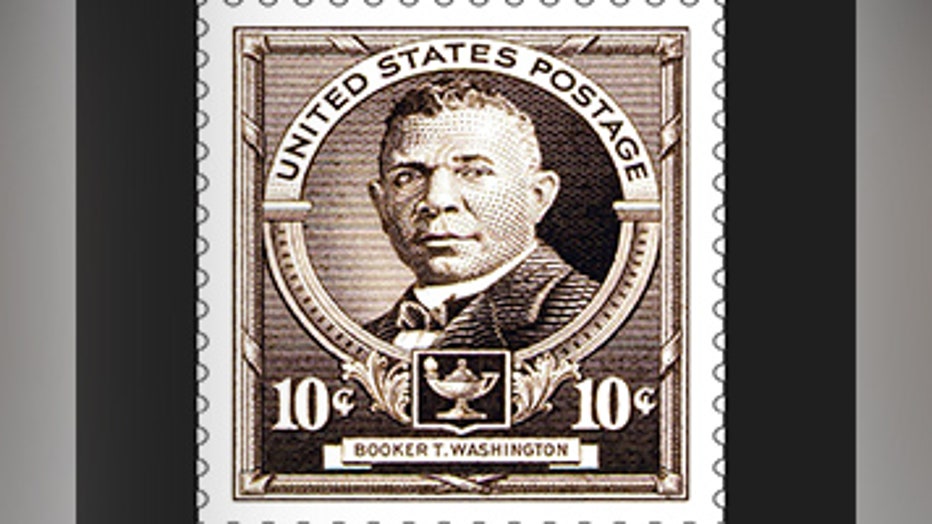
Booker T. Washington (Image courtesy of the U.S. Postal Service)
Booker T. Washington was the first principal at Alabama’s Tuskegee Normal and Industrial Institute (now Tuskegee University) and was a well-known educator and spokesman for African Americans. According to the USPS, Washington founded the National Negro Business League in 1900 and served as an advisor to presidents Theodore Roosevelt and William Howard Taft. Washington’s stamp was issued on April 7, 1940, and was the first to commemorate an African American.
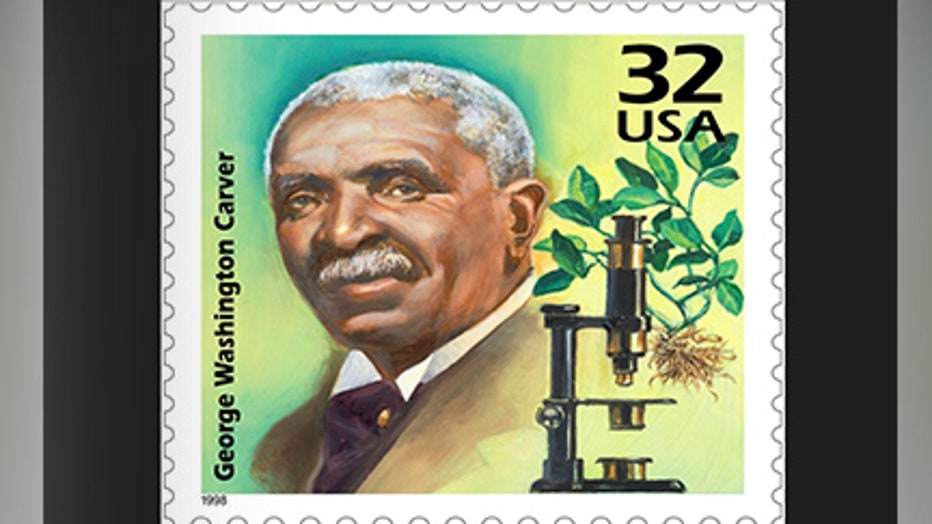
George Washington Carver (Image courtesy of the U.S. Postal Service)
George Washington Carver improved the quality of life for people through his scientific contributions to agriculture. He created products using peanuts, sweet potatoes, and soybeans and helped increase agricultural production to support poor farmers. Carver’s stamp was issued on Feb. 3, 1998.
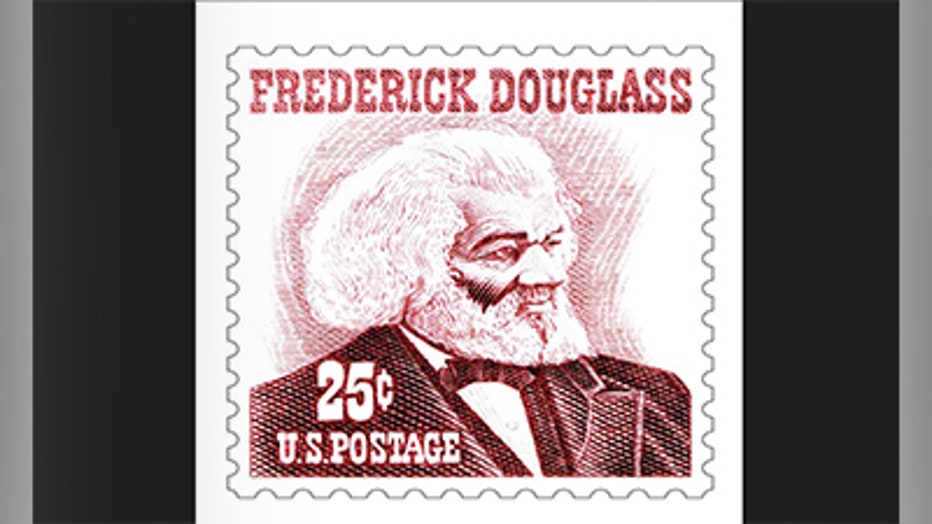
Frederick Douglass (Image courtesy of the U.S. Postal Service)
Frederick Douglass was an advocate for equal rights who argued against slavery and earned the distinction as America’s predominant African-American abolitionist during the 19th century. Douglass was the founder and editor of the North Star and a leader of the antislavery movement. He was also known as the "father of the civil rights movement." Two stamps were created for Douglass. A 25-cent stamp was issued Feb. 14, 1967, and a 32-cent stamp was issued June 29, 1995, the USPS noted.

Alvin Ailey (Image courtesy of the U.S. Postal Service)
Alvin Ailey is considered one of the four masters of choreography featured on the USPS American Dance stamp. Ailey began his career as a dancer and established the Alvin Ailey American Dance Theater in 1959. Among his signature works are "Revelations," a piece that integrates the music of jazz composer Duke Ellington; "Blues Suite;" and "Cry." Ailey’s stamp was issued on May 4, 2004.
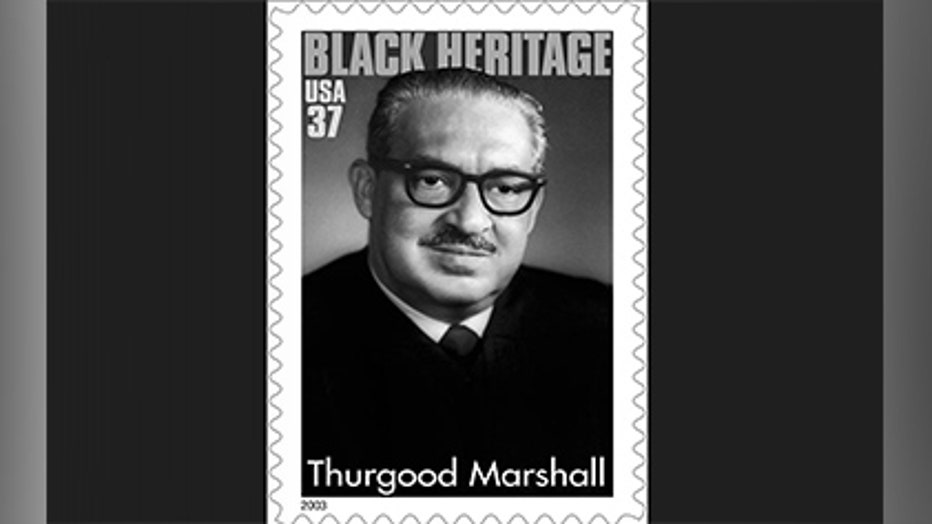
Thurgood Marshall (Image courtesy of the U.S. Postal Service)
Thurgood Marshall was a renowned civil rights lawyer in American history. Marshall became the first director-counsel of the National Association for the Advancement of Colored People Legal Defense and Education Fund, Inc. In 1954, Marshall and his legal team won in the landmark U.S. Supreme Court case, Brown v. Board of Education of Topeka, Kansas, that struck down segregation in public schools. Marshall’s stamp was issued on Jan. 7, 2003.
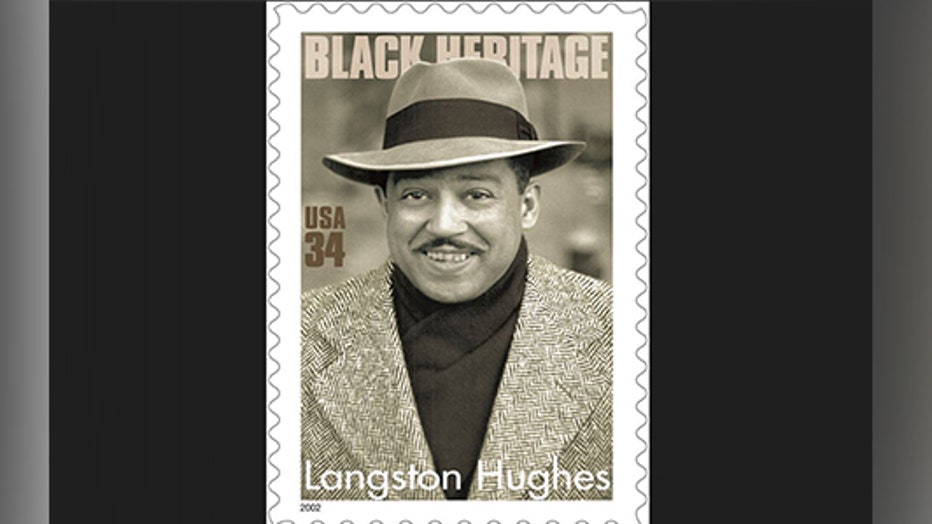
Langston Hughes (Image courtesy of the U.S. Postal Service)
Langston Hughes was an African-American poet, novelist, and playwright who became one of the foremost interpreters of racial relations in the United States from the 1920s through the 1960s. Hughes was also one of the leading voices of the Harlem Renaissance, a period between 1910 and the 1930s, considered a golden age in African American culture highlighted by literature, music, stage performance and art, according to history.com. Hughes’ stamp was issued on Feb. 1, 2002.
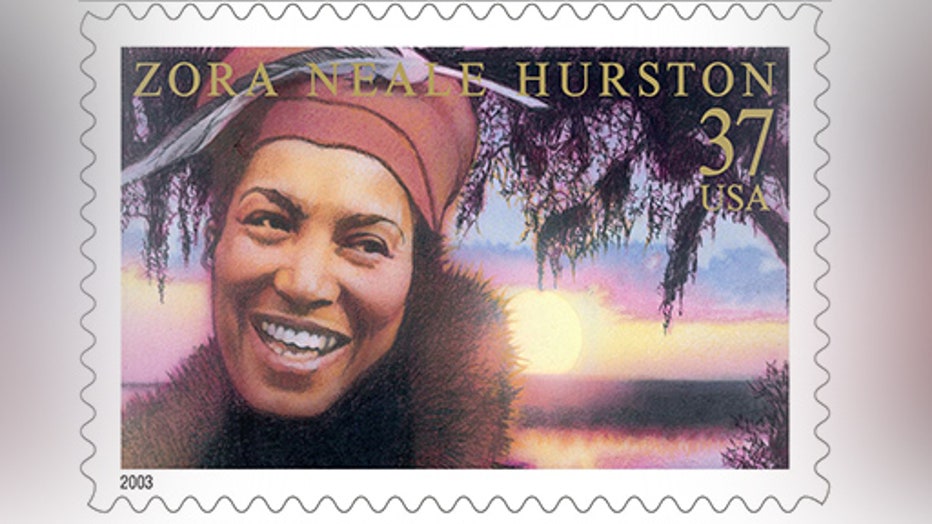
Zora Neale Hurston (Image courtesy of the U.S. Postal Service)
Zora Neale Hurston was an American writer, folklorist, and anthropologist and one of America’s most original and accomplished writers, as well as a key figure in the Harlem Renaissance of the 1920s and early 1930s. The USPS noted Hurston studied African-American heritage at a time when Black culture was not a popular field of study. Hurston’s stamp was issued on Jan. 24, 2003.
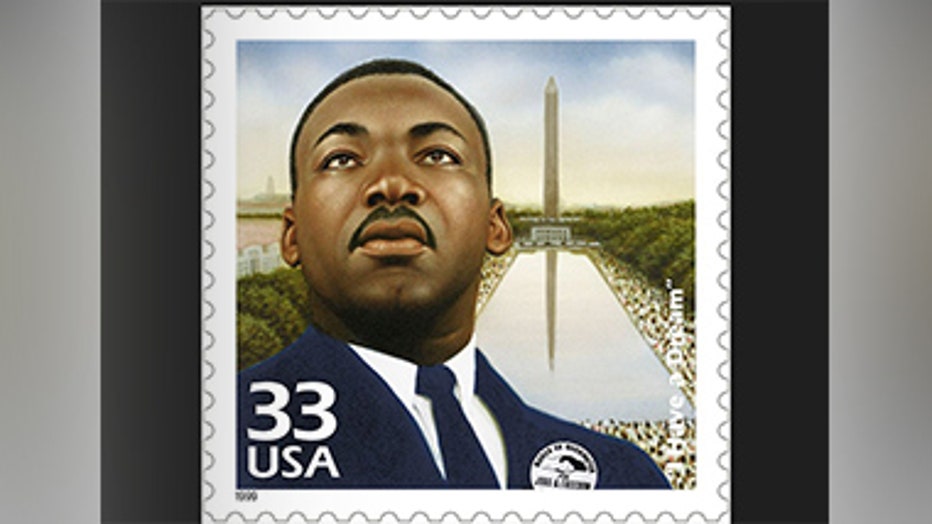
Image of a Martin Luther King Jr. "I Have a Dream" stamp issued by the U.S. Postal Service in 1999. (Image courtesy of the U.S. Postal Service)
Martin Luther King Jr. was the most powerful and popular leader of the African-American protest movement of the 1950s and 1960s. He led marches, sit-ins, boycotts, and nonviolent demonstrations that positively affected America’s attitudes toward racial prejudice and discrimination. In 1963, King was the first African American honored as TIME magazine’s Man of the Year, and was awarded the Nobel Peace Prize in 1964. King had two stamps: A 15-cent stamp issued on Jan. 13, 1979, and a 33-cent stamp issued on Sept. 17, 1999, according to the USPS.
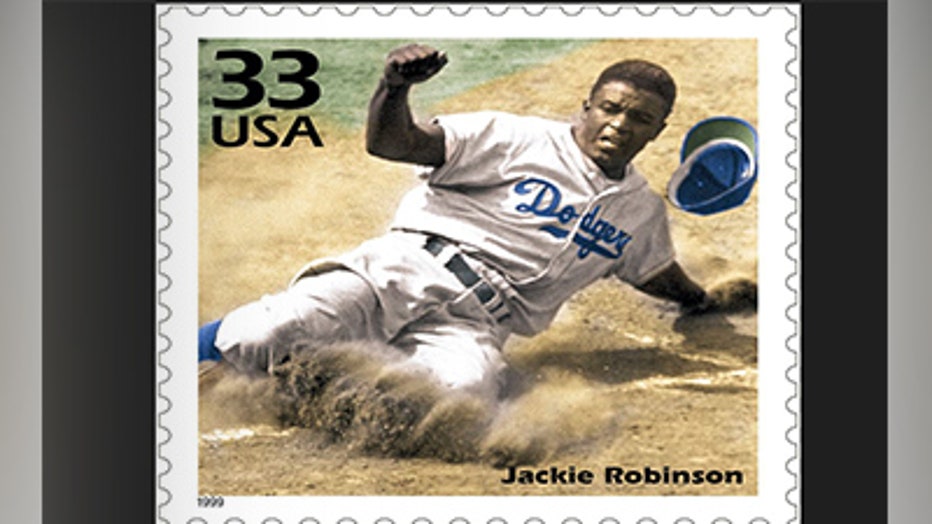
Jackie Robinson (Image courtesy of the U.S. Postal Service)
Jackie Robinson broke the Major League Baseball color barrier in 1947, had a 10-year, all-star career, became the first African American inducted into the Baseball Hall of Fame, and had his number 42 retired by Major League Baseball in 1997. He retired from baseball and became active in the civil rights movement to help break barriers for all people, not just athletes. The USPS issued several stamps of Robinson: The 20-cent stamp, issued on August 2, 1982, a 33-cent stamp of Robinson sliding was issued on Feb. 18, 1999, and a 33-cent stamp of him fielding was issued on July 6, 2000.
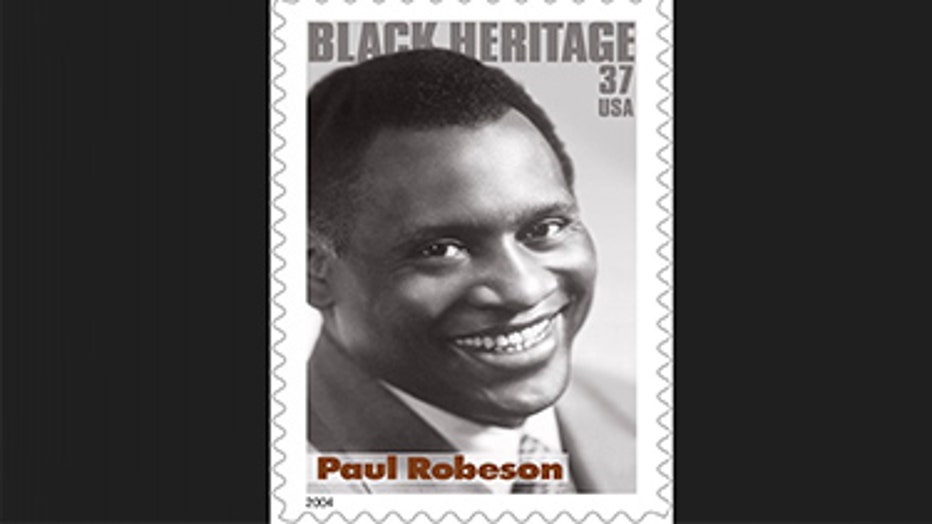
Paul Robeson (Image courtesy of the U.S. Postal Service)
Paul Robeson was an advocate for civil rights and social justice. At Rutgers University, he was a two-year, All-American in football, valedictorian, and a Phi Beta Kappa, and later earned a law degree at Columbia University, and began singing and acting. By the late 1930s, Robeson was active and outspoken on behalf of racial justice, social progress, and international peace. The USPS issued Robeson’s stamp on Jan. 20, 2004.
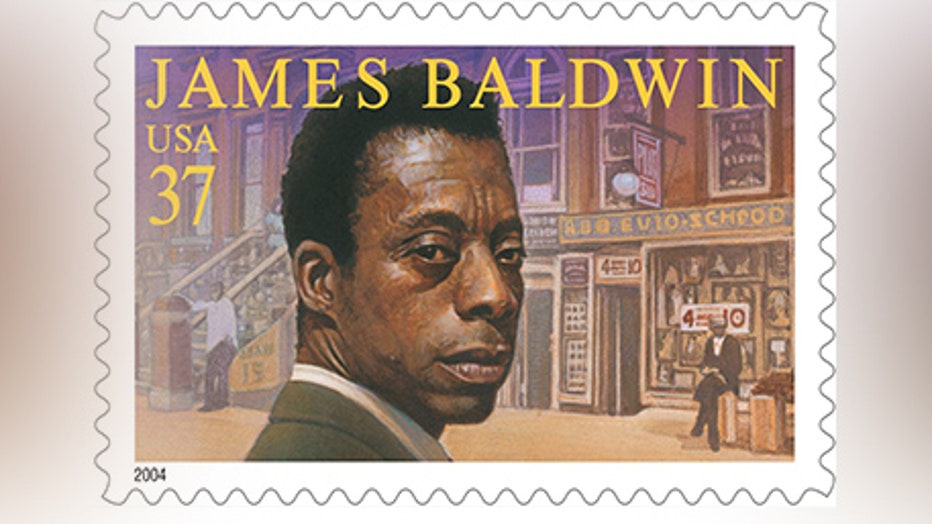
James Baldwin (Image courtesy of the U.S. Postal Service)
James Baldwin was an acclaimed writer known for his ability to address American race relations from a psychological perspective. In his essays and fiction, he suggested repeatedly that all people suffer in a racist climate. Two of his best-known works are the novel "Go Tell It on the Mountain" and the play "The Amen Corner," according to the USPS. Baldwin’s stamp was issued on July 23, 2004.

Arthur Ashe (Image courtesy of the U.S. Postal Service)
Arthur Ashe became the first African-American to win a Grand Slam Tournament. Ashe spent considerable time working for civil rights and other philanthropic causes. The postal service issued his stamp on Aug. 27, 2005.
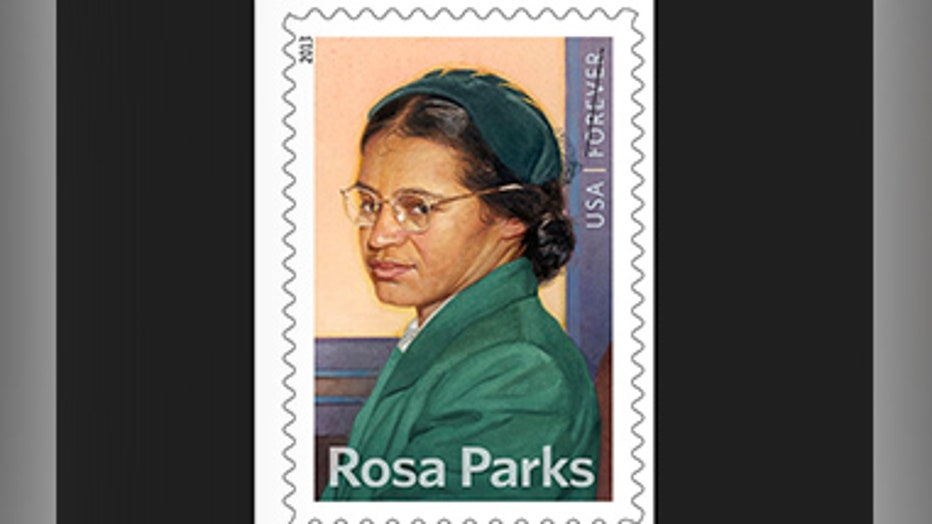
Rosa Parks (Image courtesy of the U.S. Postal Service)
Rosa Parks boarded a bus in Montgomery, Alabama, on Dec. 1, 1955. Instead of going to the back of the bus, which was designated for African Americans, she sat in the front, the Women’s History Museum noted. When the bus started to fill up with white passengers, the bus driver asked Parks to move. She refused. Her resistance set in motion one of the largest social movements in history, the Montgomery Bus Boycott. The USPS issued Parks’ stamp on Feb. 4, 2013.

Malcolm X (Image courtesy of the U.S. Postal Service)
Malcolm X became a militant activist and a follower of the Nation of Islam, a Black nationalist religious movement based on traditional Islamic teachings and Marcus Garvey’s principles of black nationalism. In 1964, he split from the Nation of Islam and started the Organization of Afro-American Unity. Malcolm X’s stamp was issued on Jan. 20, 1999.

Ray Charles (Image courtesy of the U.S. Postal Service)
Ray Charles started his own band, touring along with his quartet of backup vocalists, the Cookies, later known as the "Raeletts." In 1959, Charles scored a major hit on both the rhythm and blues and pop charts with "What’d I Say?" His growing audience continued to expand with two number-one hits, "Georgia On My Mind" (1960) and "Hit the Road Jack" (1961). Charles won 17 Grammy Awards and was inducted into the Rock and Roll Hall of Fame. The USPS issued his stamp on Sept. 23, 2013.
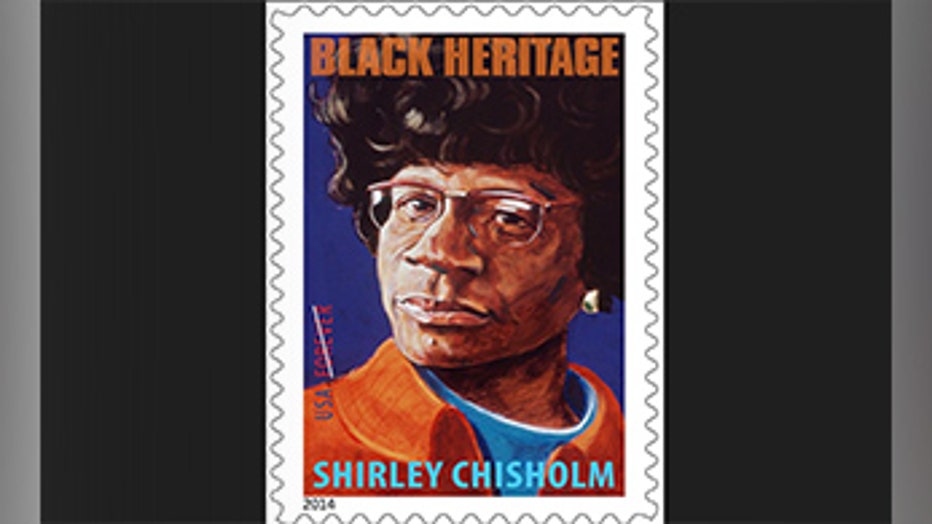
Shirley Chisholm (Image courtesy of the U.S. Postal Service)
Shirley Chisolm was the first African American woman in Congress in 1968, and the first woman and African American to seek the nomination for president of the United States from one of the two major political parties (1972), according to the National Women’s History Museum. The USPS issued Chisolm’s stamp on Jan. 31, 2014.
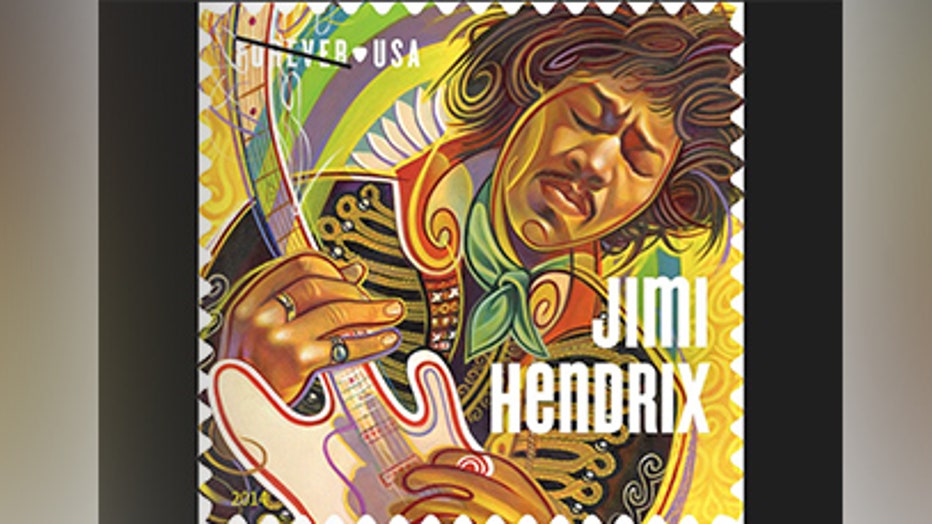
Jimi Hendrix (Image courtesy of the U.S. Postal Service)
Jimi Hendrix was one of the most important musicians of the 20th century. He combined rock, jazz, soul, and blues in his music creating a unique sound that inspired musicians and fans. The Jimi Hendrix Experience was inducted into the Rock and Roll Hall of Fame in 1992 and the U.K. Music Hall of Fame in 2005. In 1993, Hendrix was awarded a posthumous Grammy for lifetime achievement. His stamp was issued on March 13, 2014, according to the USPS.
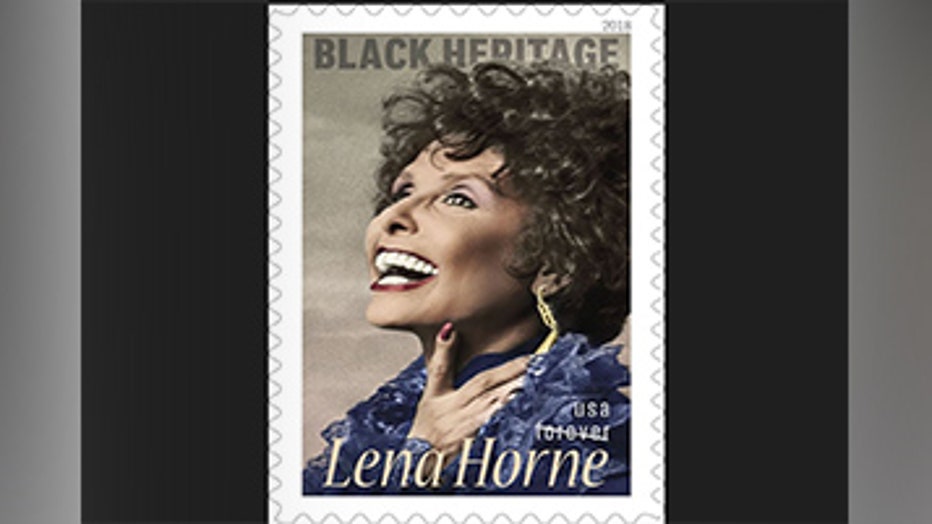
Lena Horne (Image courtesy of the U.S. Postal Service)
Lena Horne was a trailblazer in Hollywood for women of color and used her fame as a dancer, singer, and actress to inspire Americans as a dedicated activist for civil rights. She signed a contract with MGM – the first black actress to sign a long-term contract with a film studio since 1915 – with the condition that she would never be asked to take stereotypical roles then available to Black actors. Her most famous movie roles were in "Cabin in the Sky and Stormy Weather." Horne’s stamp was issued on Jan. 30, 2018, according to the US Postal Service.
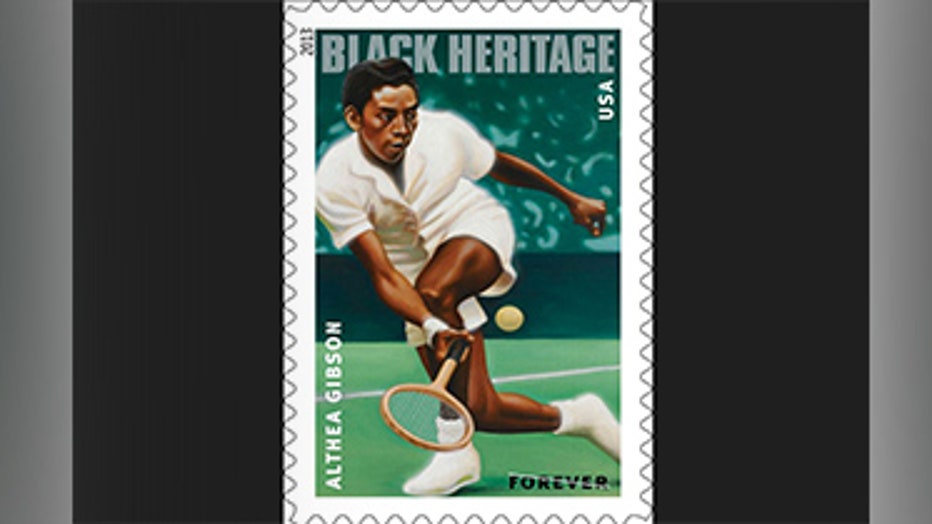
Althea Gibson (Image courtesy of the U.S. Postal Service)
Althea Gibson was the first African-American tennis player to win one of the four major singles tournaments. Gibson helped integrate tennis at the height of the civil rights movement. She twice won Wimbledon and the U.S. Championships (now known as the U.S. Open) and became the top-ranked player in the world. Gibson’s stamp was issued on Aug. 22, 2013, according to the US Postal Service.

Wilt Chamberlain (Image courtesy of the U.S. Postal Service)
Wilt Chamberlain was a 13-time NBA All-Star and played for the Philadelphia Warriors, the team moved to San Francisco, the Philadelphia 76ers, and the Los Angeles Lakers and scored an NBA record 100 points in a game, a record that’s never been broken. Chamberlain held multiple NBA records, including most total points (31,419), average points per game (30.1), total rebounds (23,924), and rebounds per game (22.9). He won the NBA MVP Award four times and was inducted into the Naismith Memorial Basketball Hall of Fame in 1979. Chamberlain’s stamp was issued on Dec. 5, 2014, USPS noted.

Medgar Evers and Fannie Lou Hammer (Image courtesy of the U.S. Postal Service)
Medgar Evers served as an official of the NAACP in Mississippi and risked his personal safety to investigate acts of racial violence against African-Americans. He led voter registration drives and organized consumer boycotts; working undercover, he investigated the murder of Emmett Till. The USPS issued Evers stamp on Feb. 21, 2009.
Fannie Lou Hamer was an American voting and women’s rights activist. In 1964, she co-founded the Mississippi Freedom Democratic Party (MFDP), which challenged the local Democratic Party’s efforts to block Black voter participation, according to the National Women’s History Museum. Hamer helped organize Freedom Summer, which brought hundreds of college students, Black and white, to help with African American voter registration in the segregated South. The USPS issued Hamer’s stamp on Feb. 21, 2009.
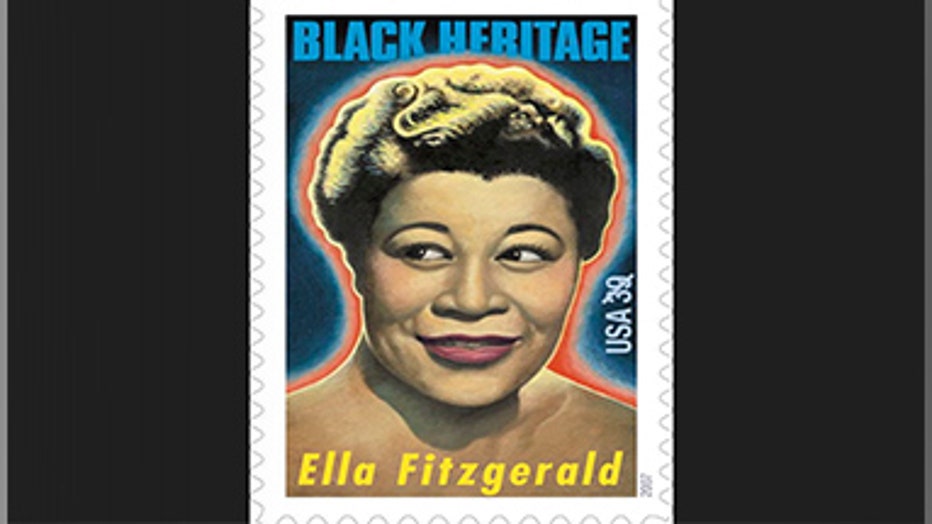
Ella Fitzgerald (Image courtesy of the U.S. Postal Service)
Ella Fitzgerald, known as "The First Lady of Song," was a revolutionary American jazz singer who performed all over the world. Her signature style included her iconic vocal range, clear tone, and ability to improvise with her hallmark scat singing, according to the National Women’s History Museum. Fitzgerald’s stamp was issued on Jan. 10, 2007.
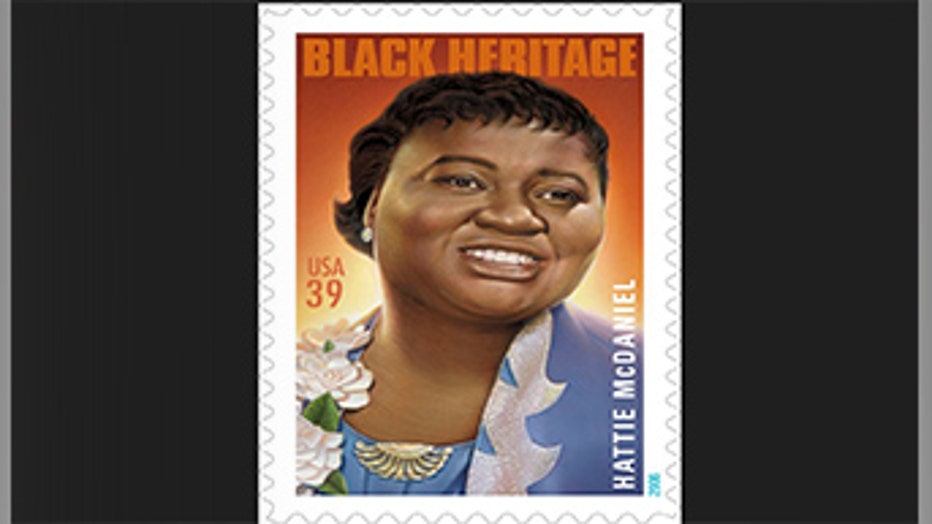
Hattie McDaniel (Image courtesy of the U.S. Postal Service)
Hattie McDaniel won an Academy Award for her role as Mammy in "Gone with the Wind." She was the first African American nominated for an Academy Award and the first to receive an Academy Award, according to the Smithsonian Museum. McDaniel’s stamp was issued by the USPS on Jan. 25, 2006.
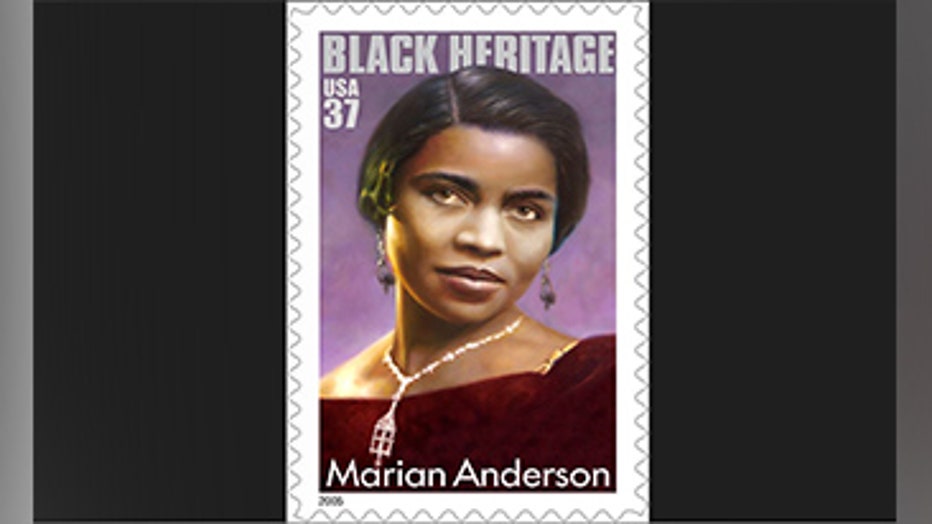
Marian Anderson (Image courtesy of the U.S. Postal Service)
Marian Anderson is best remembered for her performance at the Lincoln Memorial after not being allowed by the Daughters of the American Revolution to perform at Constitution Hall in Washington D.C. Anderson’s performance was attended by 75,000 people and broadcast on national radio, the Smithsonian Museum noted. Anderson’s stamp was issued on Jan. 27, 2005.
The U.S. Postal Service has also honored these African Americans on stamps through the years.
Postal Service director explains stamp process
The Postal Service has a process for determining which Black historical figure will appear on a stamp, William J. Gicker, director of stamp services for the US Postal Service, explained to FOX Television Stations.
"Every year, the postal service receives 30,000 suggestions from the public, and what we do is we make sure they meet our criteria, which is on usps.com. People must be sufficiently deceased, of national importance, and various things like that," Gicker said. "If they meet the criteria, they are presented to the Postmaster General Citizens Stamp Advisory Committee, they are a group of citizen volunteers that get together quarterly to review the subject proposals that come in from the public."
Once the committee decides on the person chosen to appear on the stamp, Gicker said the team begins the design process.
"When the committee decides that something will be in a certain program year, our group starts working on that project, and it’s assigned to an art director," he explained. "We have a research team that starts digging into everything about who that person was and what their achievements were, what images are available and between the two of them, how to best represent that person as a size of a postage stamp."
A stamp takes three years to make, and Gicker said there's a strict legal clearance process involved.
"The stamp is a celebratory moment, so we give it enough time to do everything we need to do to ensure it’s well-designed but also buttoned up from a legal clearance standpoint," he added.
After the stamp is ready, the post office releases it to the public — but only for a limited time.
"Stamps are printed in one press run and we try to forecast that a stamp will be available for a year and a half for commemorative stamps, which our Black Heritage stamps are," Gicker said. "But some stamps sell faster, some stamps sell a little slower, at the three-year point is when we must remove a stamp from sale to help keep other new things coming fresh into the pipeline, so three years is the max, not that most stamps last that long."
This year, the USPS told FOX TV Stations that three African Americans will appear on postal stamps: Toni Morrison, an American novelist, author Ernest Gaines, and John Lewis, a former U.S. representative and civil rights activist.
This story was reported from Washington, D.C.

